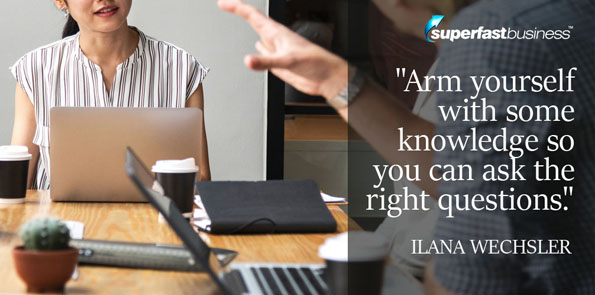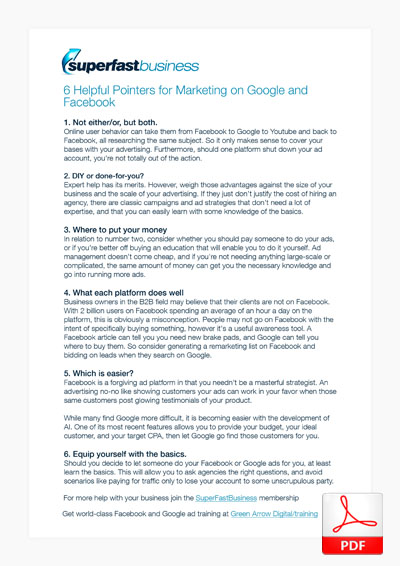Podcast: Download (Duration: 20:56 — 19.3MB)
Get Notified Of Future Episodes Apple Podcasts | Spotify | Amazon Music | Android | Blubrry | Gaana | TuneIn | Deezer | Anghami | RSS | More
In the podcast:
02:14 – Multi-device, multi-platform
04:37 – Don’t put all your eggs…
05:56 – How hard is it to understand?
07:40 – Where to spend
09:32 – Google versus Facebook
12:32 – Has it gotten easier, or harder?
14:49 – Pixels and AI
16:46 – Covered so far…
17:28 – The importance of basic knowledge
Keep your marketing methods up-to-date with help from James. Click HERE
Transcription:
James: James Schramko here. Welcome back to SuperFastBusiness.com. This is Episode 621. This is the first episode of our Paid Traffic Series, and for this series I’m bringing back Ilana Wechsler. Welcome.
Ilana: Thank you, James. Thanks so much for having me on.
James: You’ve always been generous sharing the latest and greatest tips. You are a paid traffic expert, you have come from a background of data analysis, you’ve been on SuperFastBusiness podcast before, and you’ve spoken at SuperFastBusiness Live. You’ve been a member of SilverCircle and SuperFastBusiness and just an all-around great person. So it’s always a pleasure to catch up.
Ilana: Thanks so much.
James: You’ve done a lot of research and study and you’ve run campaigns for clients, and you’ve built out an education platform which you’ve got hosted at GreenArrowDigital.com/training. And that’s what we’ll be covering in these Paid Traffic Series episodes. We’re going to look behind the curtain, we’re going to ask the questions that need to be asked. And we’re going to share some valuable tips about paid traffic.
And in today’s episode, I really want to cover this concept of why we would want to be using more than just one platform. Because I know a lot of advertisers are red hot for, say, Facebook ads. And that makes sense. And some people have been using the the tried and trusted Google Ads platform. And that also makes sense. So why would we consider using both? Is it too much work to set up? Is it too much to get our mind around? Who should be considering running their own ads? I think this is a good starting point for this series. So I’m going to hand over to you, Ilana, and just say, why two platforms, or more, in fact?
Multi-device, multi-platform
Ilana: Cool. All right. Well, there’s quite a few reasons, actually. So the first and main reason I think most business owners should consider both platforms is because in this day and age, we live in a multi-device and multi-platform world. Like, gone are the days where people will just stick to one platform and do their research on one platform.
 You know, I kind of use the analogy of like, driving (even though I’m not really big into cars). But if you think of like, the mistake business owners make is they think that each ad platform or traffic source (whatever it is), they’re like, separate roads. And as a driver, you don’t have the ability to go from one road to another road, like there’s no bridge connecting it. But the reality of the situation is that the different traffic platforms are just different lanes on the same road. So as a user or a driver, whatever, you seamlessly go between different lanes, often in the one session.
You know, I kind of use the analogy of like, driving (even though I’m not really big into cars). But if you think of like, the mistake business owners make is they think that each ad platform or traffic source (whatever it is), they’re like, separate roads. And as a driver, you don’t have the ability to go from one road to another road, like there’s no bridge connecting it. But the reality of the situation is that the different traffic platforms are just different lanes on the same road. So as a user or a driver, whatever, you seamlessly go between different lanes, often in the one session.
So it’s a misconception to just stick to one platform. Because that’s not how people behave now. Like, I might see a Facebook ad, interact with it, and then I go, well, who are these guys? Like, I don’t know, I’ve never heard of them. So I’m going to go to Google and I’m going to Google search them, and I’m going to read some reviews. And then I might check them out on YouTube and go, Yeah, alright, these guys look legitimate. And then I’ll go back to the Facebook ad. So, all in one session sometimes, you know?
So it’s a misconception to think, like, these different traffic sources are silos. They’re connected, because we live in such a connected world. And Google, essentially, are a data company, basically. And they have done serious studies on this. And they’ve tracked the device journey throughout the day, actually, in a 24-hour period. And what they found was that most people sleep with their phone next to their bed because it’s their alarm clock, and it’s the first thing they pick up when they open their eyes in the morning.
So they’re checking their phone, they’re checking their email, and then, you know, on their commute to work, they’re still on the phone, checking, perhaps, social media and Twitter. And then they get to work and they’re on their desktop, and then searching things on a desktop and then back home, they’re on their iPads. So that’s just in the one-day period. So I think it’s a misconception not to think that way as an advertiser and as a business owner. So that’s, I think, the big point of why you need to think about both.
Don’t put all your eggs…
The second reason is it’s a good insurance policy, because isn’t there some saying like the worst number in business is the number one? You know, that you shouldn’t put all your eggs in that one advertising basket. Because you know, if you’ve been around for long enough and you’ve done a lot of Facebook advertising, you probably have heard or maybe experienced yourself that Facebook has shut down your ad account with absolutely no warning. And you can sometimes get it back, but often it takes a few months. So it’s just good insurance policy to diversify your advertising, I feel. So that’s number two.
 The third reason, I think, is that you really need to optimize for the customer journey, not the platform. So kind of like point number one is thinking holistically as in a customer journey, etc.
The third reason, I think, is that you really need to optimize for the customer journey, not the platform. So kind of like point number one is thinking holistically as in a customer journey, etc.
Should I keep going?
James: This is great. It’s reinforcing stuff. It reminds me of an episode that I recorded wayback in June 2013. So we’re talking over five years ago, Episode 206, What’s New With Google? In that episode, I talked about some data that I got from Google especially about being smartphone ready. We’re talking over five years ago, be smartphone ready. And we’re here now. Now, phone is dominant. And they were talking about multiple screens that in 2013, there was a huge amount of people using laptops and tablets and smartphones, all in the same day even within the same hour. So that was very important. You’ve got to be using mobile-friendly channels. You’ve got to be using multiple devices and people are going to switch between platforms. It makes sense.
And you’re right about the data – they know everything. And I’m just thinking about my own personal use of the Internet. I’m using Google and Facebook on a daily basis. So it makes sense, if they’re two of the largest, most dominant places where people’s attention go, that’s a good case to get on there.
How hard is it to understand?
So if we accept that it’s a good place, maybe we just tackle the challenge of, is it difficult to be able to understand both, and and who should even attempt it? Because I know at a certain point, a business owner might consider getting a specialist in there to have a done-for-you service. And you certainly provide an agency service for customers. But there’s this huge gap, I think, where people really will need to (and I certainly did in the beginning, and I’m sort of a little bit involved in it, but not fully), where you might want to do some of this stuff yourself, or at least have a really good understanding of it so that you can work well with whoever does do your ads.
Ilana: Yeah, exactly. I think of course there are merits to hiring an agency, but I think only really once you get to a certain size in terms of like, the volume of traffic that you’re buying and the amount that you’re spending on the ad platforms. If you’re spending, I think, less than $5,000 a month on ads, you absolutely can do it yourself. And you’re probably really only running a handful of tried and tested and proven strategies that, you know, they’re not so fancy. They’re not so complicated and ninja. They’re pretty stock standard. You might be running a classic remarketing campaign on both platforms and maybe some kind of outreach thing, which doesn’t require a huge amount of expertise.
Like, yes, of course, you’re going to have to learn how to use the systems, and that is the initial bit of learning. But once you’ve kind of learned the basics and the fundamentals, I think it’s very learnable, obviously, because I’ve been doing this for so long. And I’ve taught so many people how to just do the basic stuff that it’s almost like, when you sort of don’t want to spend a lot of money on ads and often don’t need to, which is probably the biggest point, you know, it’s kind of over engineering to get an agency to run it for you. It’s kind of like – going back to a car analogy – it’s kind of like buying a Ferrari to go and buy the milk from the corner store. You know? Like, you just don’t need that.
Where to spend
James: Yeah. Basically, I think, you know, I did a recent video about why there’s no cheap Facebook agencies. There’s this huge amount of people out there trying to hire someone to do their ads and they have a $500 a month budget. It’s just that that’s not the zone where you’re going to find someone to run your Facebook ads. It’s simply not worth it for a competent Facebook ad agency to do that size account.
“At least set up the low-hanging fruit campaigns.”
And it becomes worthwhile to spend that money to learn how to do this yourself in the beginning. At least set up the low-hanging fruit campaigns. Because you’ve talked about this in our previous episodes, which things should you do, like the top 10 things that you really should be doing as you’re starting out. So we have provided some good introduction information to that, and then you can go a little bit deeper into that. But for an investment of a few hundred dollars a month, for example, if you want to take on some paid education, you can get access to someone who runs an agency, who has really, really good experience and can take your campaigns way beyond the level that you’re going to get if you pay someone $500 a month to have it done for you. Because they’re not going to be that good, are they?
Ilana: Well, no, that’s the thing. Like, anyone who, in my experience, really knows what they’re doing, their expertise is valuable, right? So they charge decent money because they’re good and they get a return on investment for their clients. But often these people have a minimum ad spend in order to run complicated campaigns, etc. You know, you do need to kind of be managing quite a bit of traffic in that respect.
But I’m very mindful everyone has a budget, and business owners shouldn’t feel pressured to spend $10,000 a month on ads. Often, they don’t need to. It’s just, they’re just doing some really standard stuff that’s quite basic. And I’m of the belief that the money they spend on the agency that’s really just doing bread and butter stuff, they can just pour into doing more ads. Like, it just kind of makes more sense for them.
Google versus Facebook
James: Yeah, perfect. So when it comes to the two, how do you see them working together, the Google and the Facebook campaigns? What do you think the differences are and how you look at them when you’re thinking about which lane to be in for what kind of travel?
Ilana: Yeah, it’s interesting. And I guess this is where I think a little bit of understanding of how each of the platforms work enables you to think in a sort of a strategic way, and it’s different for different businesses. So if I had $1 for every time I’ve been heard someone say, “Look, I’m in B2B, and therefore, you know, my clients aren’t on Facebook”, for example, therefore they only do Google… Well, basically, there are lots of ways. The point is, I mean, Facebook have two billion, that’s with a B, active users, and the users spend apparently an hour a day on Facebook.
So yes, I remember I even said in the presentation in SuperFastBusiness Live, yes, I don’t go to Facebook to buy new brake pads for my car. But if I was going through my Facebook newsfeed and I saw an article about the warning signs that I might need some new brake pads because I drive a big family car, I’ve got young kids, well then I’m going to be interested in reading it. So it’s a great awareness tool, because there’s no doubt people’s customers are there. Yes, they’re not in the frame of mind of buying new brake pads, but it’s a good sort of awareness tool, and then you can target them on Google. So that’s kind of one example.
Another example is people who might find that Google’s just too expensive. That’s also another kind of common, I guess, complaint about Google. And yes, Google is expensive, absolutely. I’m not going to dispute that. And that’s because at least Google search, which is, you know, when you go to Google.com, and you might type in “lawyer, Sydney”, for example, that’s going to cost you like $50 a click, which is pretty crazy. It is an amazing advertising opportunity, the fact that you can slide your business card under the nose of someone at the very instant that they’ve searched for something, but you pay for that privilege. So what about if you try and do some outreach on Facebook to generate a remarketing list or to get a list of people who’ve come to your website who might be interested, and then you only bid on those people when they Google Search something?
So there’s lots of kind of ways that you can combine the platforms to just create, like, a hyper targeted a group of people to come to your site. And then you present your services or products in front of them.
James: Right. So you’ve got your super hyper intent-focused person who’s actually looking for something. And then you’ve got the the person who is in a particular environment for at least an hour a day. Gosh, for that average to be an hour…
Ilana: It is.
James: …the non-internet marketing people must not be spending as much time as some of the people I know. I’m pretty sure a huge segment of my audience would have their Facebook browser open all day long, because they just seem omnipresent, which is, it’s another issue altogether. One of the upcoming episodes is with a technology expert who is talking about the dangers of over use of social media and especially in relation to kids, right? It’s a huge problem for kids who haven’t grown up without the internet.
Has it gotten easier, or harder?
So it’s really fascinating to see where things will be going. I certainly am getting a vibe that AI is going to be super important in the future when it comes to getting help with the campaigns. Would you say that it’s easier or harder to run campaigns now than it was, say, five years ago?
“Facebook is a very forgiving ad platform.”
Ilana: That’s a good question. I think, especially running Facebook ads, Facebook is a very forgiving ad platform, I often say to people. Because you know, it’s a big advertising faux pas to, let’s say, to show an ad to an existing customer, let’s say. So let’s say I’m looking to buy a pair of shoes, and I buy them and then the company makes a bad mistake and they show me an ad for the shoes, even though I purchased. So that would be a big no-no in the advertising world. Like, what a waste. But on Facebook, if you show ads to your customers, often they just become endorsers of your product.
And so in that respect, I find Facebook ads is a very forgiving ad platform because you don’t have to be such a savvy, I guess, strategist. Because if you do accidentally show your customers your ads – actually, we did that intentionally, by the way, that’s another episode – because these customers will say, “Oh my god, I bought these shoes, and they were the most comfortable things I’ve ever worn. They were like walking on pillows”, for example. And suddenly your ad is turned into this amazing ad with all these testimonials. So I do find Facebook ads to be very forgiving.
A lot of people find Google to be a bit of a tough one. But with the whole development of AI and Google actually have been slowly removing a lot of the, I guess, control that advertisers have, I do feel it is becoming easier and easier. And it will only continue to. Like, for example, this year they rolled out a brand new Google interface. And one of the developments with the new interface is that they removed what’s called the display planner, which was what advertisers used to see where they could put their ads. And now there’s no ability to do that, at least to see where you can put your ads. You can still put them somewhere, but Google is definitely going down the road of AI. Basically, you give us a budget, you tell us who your ideal customer is, and how much your target CPA is, and we’ll go away and find those customers for you. It’s quite interesting.
Pixels and AI
James: It is very interesting. So I keep hearing about seasoned pixels and training your pixel. Maybe you want to explain that, because that seems to be where the AI is kicking in hard.
Ilana: Absolutely. So each advertising platform have their own pixels, which is effectively just a little bit of code that the platforms give you that you install on your website. It’s kind of like Google Analytics codes, it gives the ability to track the people who’ve come into your website. Once the pixel starts registering people, they have all this data on everyone and they can start learning more about the kinds of people that come to your website and the kinds of people that purchase and the kinds of people that don’t purchase, etc. And it develops knowledge to some degree.
So, this is not new in terms of like, Facebook, because everyone – or not everyone – most people know the concept of a lookalike audience. So a lookalike audience really leans heavily on a pixel to learn who are the people who are most likely to convert, and therefore find new people who are like those people. And Google has definitely been investing heavily in catching up to Facebook in this respect with AI.
“Google have insane amounts of data on people.”
And if you think about it, Google have insane amounts of data on people. They own the phone, they own, obviously, Gmail, they own YouTube. They own Chrome browser. So they have insane amounts of data on people. And now they’ve really been able to connect the dots of people. They’ve been able to connect, I guess, the YouTube dots with the Chrome, you know, to all the data points on people to form an overall picture as to the browsing behavior of these people. Are they interested in something? Are they not interested in something? Are they in the market, which is one of the targeting in Google for something new because of their browsing history. So it’s definitely where this space is going.
And ultimately, I reckon in you know, three to five years, it will be in a completely different place to where it is now, and we just effectively learn how to build the system well, and then the system will just take over.
Covered so far…
James: Right. So probably worth covering at this point, then, if we accept it’s good to be on both platforms. We’ve also discussed who might be interested in actually learning this that it’s useful for, because you’re not going to be hiring someone for a few hundred dollars a month and get a good result. You might as well learn the basics and then develop it from there. We’ve talked about how you can get access to a super qualified, experienced and nice person to help you with your training programs. And we’ve also mentioned that there are some back episodes, which we’ll link to in the show notes, of some of the setup things, the top 10 things that you want to do.
Ilana: Can I just add one more thing…
James: You can.
 The importance of basic knowledge
The importance of basic knowledge
Ilana:… which I think we didn’t touch on, it’s really important, is, there was a thread in SuperFast-Business.com about this, like the importance of yes, learning the basics, at least to arm yourself with some basic level knowledge. If you do decide that you just don’t want to learn it, which is totally cool, at least arm yourself with some knowledge so you can ask the right questions for agencies. I think that is really important, because so many business owners just hand over the keys of the kingdom to these people and they don’t understand the right questions to ask these agencies. And there are so many unscrupulous agencies out there just doing really bad things to business owners.
One of the questions I think that people need to ask, and I can’t tell you how many times and it’s just so wrong, is that a lot of these agencies will say to the business owner, look, let me just set up your ad account for you, be really helpful, and I’ll create it all for you. And effectively the consequences of that are such that the business owner doesn’t own their own ad account. When they want to leave that agency, they lose their ad account, which you might not realize is such a big deal, but it is a really, really big deal, because you lose that pixel that’s beautifully seasoned, especially when you’ve paid for the traffic. You’ve lost all the data that comes with that – you’ve lost the converting keywords, you’ve lost which audiences work, and you’re like, starting from scratch. So many business owners don’t appreciate and realize the difference. And so, if you do a bit of learning, you’ll kind of learn the consequences of that and learn how to ask the right questions of these people.
James: Gosh, you really love this stuff, don’t you, Ilana?
Ilana: I do. I guess I live and breathe it every day.
James: You talk about a seasoned pixel as if it’s like a roast that you’ve been working on all day.
Ilana: Yeah, you’ve been basting it all day. Exactly.
James: I imagine it would be worth someone with a substantial size business who even, definitely, if they’re running their stuff in house, to be getting access to your training.
And I’m sure you could also help people with what they should be asking and what they should be focusing on because it’s a pretty open field. There’s a huge amount of opportunity. And I think in our next episode we’ll cover a couple of use cases, maybe walk through a campaign and talk about how people might have sort of set up a campaign on both Google and Facebook to work hand in hand, and to build out a presence and to get that direct intent traffic and then to leverage it, so using both platforms. What do you think about that?
Ilana: That sounds great.
James: Alright, well, thanks so much for sharing.
That’s our first episode of The Paid Traffic Series with Ilana Wechsler from GreenArrowDigital.com. She’s got training at /training available. If you want to get trained on Facebook and Google ads, that’s the place to do it, with Ilana’s help.
I’m James Schramko. This is SuperFastBusiness and we’ll catch up with you in a future episode.
Ilana: Thanks so much, James.
Access a community of business pros inside JamesSchramko membership
Get world-class Facebook and Google ad training at Green Arrow Digital
Liking the show? Subscribe on iTunes for all the episodes











Leave a Reply